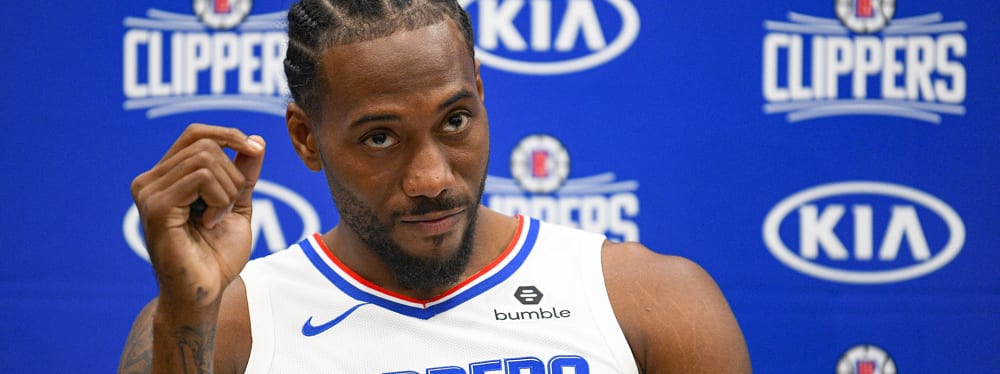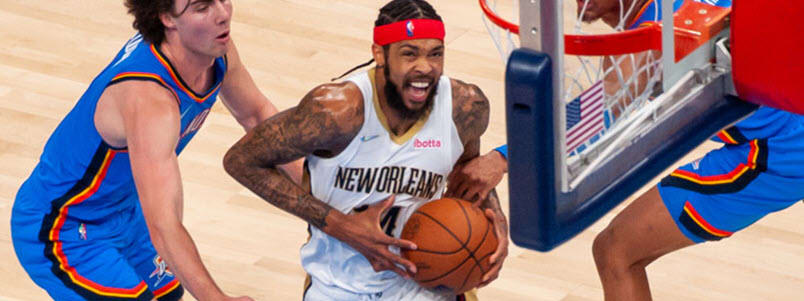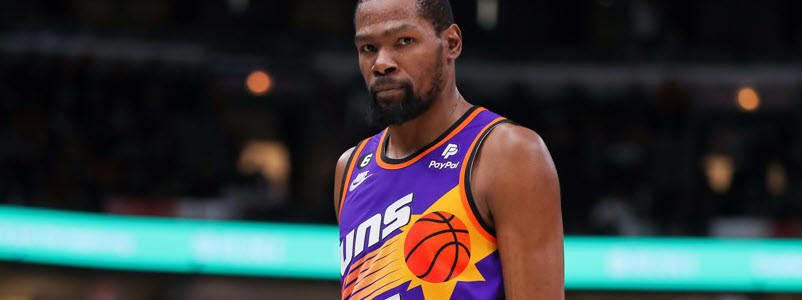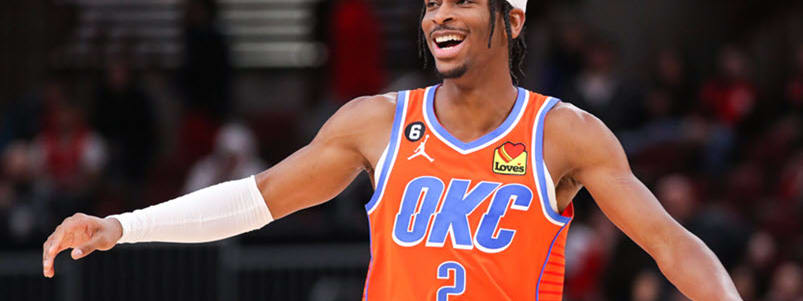Recent RotoWire Articles Featuring Wesley Matthews
See More
Matthews will be almost 37 years of age when the 2023-24 season begins, a sure sign that his time as a viable NBA player is coming to an end. He played 52 games during the 2022-23 season, averaging 3.4 points and 0.8 three-pointers in just 15.8 minutes per night. He has been well outside the top 300 in each of the past three seasons, and it would seem as though that is likely to happen once again. To be clear, he should not be drafted anywhere.
Matthews' chances of putting up fantasy-relevant production in the twilight of his career are basically zero at this point. He could start for the Bucks, but as we saw to close last season, that does not mean he should be targeted in fantasy leagues. At best, potential managers could view Matthews as a short-term streaming option when in need of some perimeter scoring. With that said, Matthews has not averaged more than 1.6 triples per game since the 2018-19 season, meaning there almost certainly will be more intriguing options available.
Matthews played for the title-contending Bucks last season, seeing the smallest workload of his career. In 24.4 minutes, he averaged 7.4 points, 2.5 rebounds, 1.6 threes and 1.4 assists. This season, Matthews has changed title contenders, signing a one-year, $3.6 million contract with the Lakers. The 34-year-old figures to see a similar role in L.A., though it's possible he'll come off the bench. He'll primarily be competing for minutes with Kentavious Caldwell-Pope and Alex Caruso. Ultimately, Matthews is a specialist role player who is unlikely to be relevant in most fantasy leagues.
In his 11th NBA season, Matthews will be returning to Wisconsin, where he played high school and college ball, to suit up for the Bucks. The veteran shooting guard is coming off a 2018-19 season where he saw time with three different teams. Between the Mavericks, Knicks and Pacers, Matthews appeared in 69 games and averaged 12.2 points per game, which is his lowest mark since his rookie year. While Matthews certainly isn't the same scorer he was earlier in his career, he is still a very capable three-point shooter, having shot at least 37 percent in each of the last two seasons, and he's never dipped below 36 percent in his career. With the departure of Malcolm Brogdon to the Pacers this offseason, there is a hole at the shooting guard position for the Bucks. And as of now, Matthews appears to be the top candidate to start in the backcourt alongside point guard Eric Bledsoe. However, given how head coach Mike Budenholzer chose to limit his top players' minutes last season, it seems unlikely that Matthews will top the 30 minutes per game threshold, which he has done in each of his last nine seasons.
Matthews was once again a mainstay in the Mavericks' rotation last season, sticking in the starting five and averaging 33.8 minutes per game. He did struggle with an injury late in the year, though, as Matthews wound up missing 18 of the final 19 games of the season due to a stress fracture in his right leg. Prior to going down, the nine-year veteran saw his numbers take a slight dip across the board and finished with 12.7 points, 3.1 rebounds, 2.7 assists and 1.2 steals. As been the case for his entire career, Matthews' biggest contribution came as a three-point marksman. He shot 38.1 percent from beyond the arc and hit 2.4 threes per game, which helped space the floor for point guard Dennis Smith and Harrison Barnes to get to the rim. Matthews' Fantasy value could be in trouble, however. The Mavericks selected fellow wing Luka Doncic with the third overall pick in the draft and the EuroLeague MVP is apparently NBA ready and set to play a significant role in the rotation. Matthews seems likely to be a player that has to give up some minutes as a result, so the veteran could have trouble coming close to the 33.8 minutes he averaged in 2017-18. Like Doncic, Matthews can play both wing positions, so there's a chance the two could be on the court at the same time. That said, the Mavericks also added star big man DeAndre Jordan in free agency, so in addition to Doncic's presence, there will be more mouths to feed all around. Matthews should continue to be a reliable three-point shooter, but the offseason roster reconstruction likely impacted his Fantasy value in a negative fashion.
Matthews put together another relatively healthy campaign, starting all 73 games he played in during his second year in Dallas. He saw his overall averages increase, as his 13.5 points, 3.5 rebounds, 2.9 assists and 1.1 steals were all slightly up from a season prior. One of his biggest contributions continued to be his three-point shooting (2.4 per game), though his 36.3 percent clip from deep was still down from his 38.3 percent career number, meaning there's room for improvement. Heading into his ninth season as a professional, Matthews should again be in line for a starter's workload. The Mavericks brought in point guard Dennis Smith with the ninth overall pick in the 2017 NBA Draft, they'll have leading scorer Harrison Barnes back and will also have Nerlens Noel for the entire season, so there's going to be more mouths to feed on the offensive side of the ball. That means Matthews could see a few less looks overall despite likely playing minutes close to the 34.2 he averaged in 2016-17. Matthews isn't necessarily an elite shooting guard option, but considering the difficulty of finding a serviceable Fantasy shooting guard, similar numbers would likely put him in consideration for a selection in the middle rounds of most drafts.
Matthews tore his Achilles in March of 2015 but vowed to be ready for the start of the 2015-16 season. The veteran made good on his promise, recovering in less than eight months to start and play 26 minutes in an opening night win over the Suns. While Matthews was never quite himself last season, he still finished with respectable per-game averages of 12.5 points, 3.1 rebounds, 1.9 assists and 1.0 steals. His field-goal percentage took a significant dive (career-low 38.8%), yet he remained a strong outside shooter, converting 36 percent of his 6.7 three-point attempts per game. With a full offseason to prepare, a bounce back seems likely as Matthews enters his age-30 season. The Mavericks added Harrison Barnes on the wing, but the departure of Chandler Parsons should make that a relatively seamless swap in terms of its potential impact on Matthews' role. Expect Matthews to hold a firm grasp on the starting shooting guard spot, while likely moving closer to his career shooting efficiency numbers (43.5% from the field, 38.7% from the three-point line). If Matthews is able to stay healthy, he's worth a look in the middle rounds in most leagues.
Matthews was leading the NBA in three-pointers made before suffering a torn Achilles tendon. As a result, the six-year veteran played a career-low 60 games. Before the injury, Matthews averaged 34 minutes per game and finished the season averaging 15.9 points, 2.3 assists, and 3.7 rebounds. He shot 45 percent from the field and 39 percent from three-point range. Despite the injury, Dallas signed Matthews to a max-deal in the offseason, citing his ability to defend and stretch the floor on offense as being well worth the risk. Unfortunately, Achilles injuries are very difficult to bounce back from, though Matthews appears determined to be ready for Opening Night. Despite the optimism, the Mavericks plan on handling his rehab conservatively, understanding Matthews is a major piece of their team moving forward. Don't be surprised if he misses the start of the season and needs a significant amount of time to return to form. His style of play isn't predicated on athleticism, so he's better suited to bounce back than others, though a considerable dip in productivity should be expected.
In each of his five NBA seasons, Wesley Matthews has increased his three-point total on, settling at 201 successful attempts in 2013-14. The mark was the second-most by a Blazer in franchise history, and only a degree behind Damian Lillard's 218 on the season. In the meantime, Matthews recorded 16.4 points, 3.5 rebounds, and 2.5 three-pointers per game, joining his fellow starters with his own personal career highs. He's a true difference maker on the defensive end, though, generally taking on an opponent's top wing on a nightly basis. During Portland's six-game first-round victory over the Rockets, for example, Matthews teamed with Nicolas Batum to harass James Harden into 38-percent shooting from the field, a colossal eight-point drop from Harden' season-long clip. Although Matthews will likely never put up intriguing lines, outside of his proficiency from deep, his durability - namely, only missing games in one of his five seasons - is all but a given. Additionally, no matter the composition of the guard rotation, since Matthews signed with the Blazers in the summer of 2010, he's been handed at least 33 minutes per game.
After suiting up for every game in his first three seasons in the league, Matthews missed 13 games due to hip and ankle injuries and would later require surgery on his non-shooting elbow in the offseason. In spite of the various ailments, Matthews still averaged a career-high 35 minutes per game, largely due to a dearth of talent on the Blazers' bench. Aside from a small uptick in scoring (14.8 points) and three-point production (2.4 threes per game) and a downgrade in rebounding (2.8), Matthews more or less held constant across the board. Never a player to pile up notable counting stats outside of the scoring column, Matthews figures to see his numbers take a hit after the Blazers made beefing up their reserve unit a priority in the offseason. In addition to signing Mo Williams and Dorell Wright and trading for Robin Lopez, Portland added C.J. McCollum with the 10th overall pick in this summer's draft. With Damian Lillard and Nicolas Batum locked into full-time roles at point guard and small forward, Matthews' playing time seems to be the most threatened by McCollum, a talented scoring guard who will be tabbed as the Blazers' sixth man to start the season and could ultimately usurp Matthews of his starting job.
With the retirement of Brandon Roy, Matthews filled the shooting guard slot for the Trail Blazers and excelled at just about everything, except the “shooting” part. While Matthews held steady across pretty much every category, a 41.2 field goal percentage cut his scoring average down two full points per game. Matthews was plagued by an over-reliance on the jump shot, as he attempted nearly half a shot more from beyond the arc per game and shot at a lower percentage than the year before. He also got to the line a lot less, dropping from 3.8 free throws per game to 2.6. If Matthews can curb his outside shooting and get to the rack more frequently, he could emerge as Portland’s most viable perimeter threat. The team will likely lean on Matthews early on with rookie Damian Lillard slated to handle point guard duties, which should only help his numbers. Ideally, fantasy owners would like to see Matthews add more assists to his repertoire, but he makes up for that with his dependable steals totals (1.5 per game in 2011-12) and low turnover rate (1.1 per game). Though he perhaps relied on the three-ball too much, he still nailed two threes per game, tying for 12th in the NBA. Matthews has the potential to work out the kinks in his game and become an upper-level shooting guard this season.
Matthews has been rehabbing his “messed up” ankle all offseason, but it’s believed he should be ready when training camp starts. With Brandon Roy’s career teetering on the edge of a cliff, Matthews has come to be considered the shooting guard of both the present and the future for the Trail Blazers. Through 69 games as a starter last season, Matthews averaged 16.9 points, 3.3 rebounds, 2.2 assists, 2.1 three-pointers, 1.4 steals, and 1.7 turnovers in 36 minutes. His minutes and scoring tapered off a little after the Blazers acquired Gerald Wallace at the trade deadline, but that loss in minutes may have also been related to the ankle injury he was fighting through for the last two months of the season. Matthews may still be undervalued in some drafts due to his season averages being slightly lowered from the 13 games he has used in limited action at the beginning of the season, but don’t let him slip in drafts. His ability to contribute better-than-average stats in three-pointers and steals make him an ideal shooting guard to own in fantasy.
Matthews' 2009-10 campaign has to be considered a success -- from a financial perspective, if nothing else. He started the year as an undrafted free agent, signed a non-guaranteed contract with the Jazz, started 48 games, and then signed a five-year offer sheet, worth about $33 million, with the Trail Blazers this offseason. As with his real-life skillset, he offers no one standout tool in fantasy, either. Nor is he likely to play more than 30 minutes per game, making him waiver-wire fodder in most formats.













